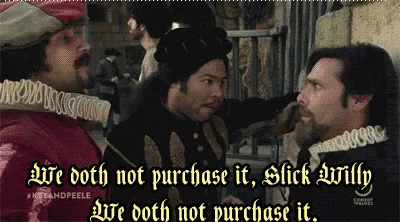
Making it Playable
Keith Hamilton Cobb
Life is frightening. And it compels those alive to seek safety. A look back through history will reveal the wrangling of men and women for power, position, and anything that they perceive would create for them a life less frightening. Remember first that fear takes millions of forms. One might need to look closely, as what has come to look to us like simply being alive is really a perpetual striving for life. That striving could be as unremarkable as seeking to secure a daily wage or as extraordinary as seeking the presidency—but it is all the same striving. People seek purpose to define life for them because definition is less frightening than the unquantifiable. They seek reasons, but life is largely reasonless. It is as unjust as it is absurd, and we human animals clown about perceiving ourselves to be not only intrinsic to it but at the very center of it. The more absurd and unjust our world becomes, the more ethically unhinged are the individual strivings for “safety” of the human animal in the face of it.
The Early Moderns did that, too. There was never an age wherein human beings did not resort to acts of self-service too heinous to be described if they perceived the circumstances to necessitate it. Othello does it. Certainly, Iago does it. And, perhaps to a less obvious extent, so do the four other major characters in the play. I do it. Every human actor on the world stage who hasn’t achieved some elusive, transcendent spiritual state does what it is suggested that the characters are doing within the frame of Shakespeare’s Othello. Shakespeare said any number of things about this common proclivity of man. And in his plays, characters are generally all engaged in this most recognizable of human engagements.
In acting school we would have called it “pursuing our objectives.” But we called it that because we were learning to imitate life. We were learning to portray people in the process of chasing purpose, or comfort, or safety—on the basest level of human nature all the same pursuit. We were learning to enact the characters that people all of Western drama. They were all people who leveled as much intention and self-determination as each might muster on the navigation of a journey through the unquantifiable and absurd,, terrifying reasonlessness of living. And they were all, with the exception of a few, white. I was able to easily ascertain how each human being born of the pens of the Western playwrights were like me at this most basic level. Beyond that foundational humanity, no one seemed at all concerned about how I, as a Black boy, was different. In Othello, I am acutely aware of the six main characters grasping at purpose, or comfort, or safety as they navigate the absurdity of life. What makes them unequal is the extent to which their individual human striving is well-written. While all of them are more archetypal than human, some are written far less fully than others, and the eponymous hero the least completely of all. And I wonder why.
I am an actor, and as such, my interest in any play is its playability. How does it work, with me, for me? For me, I would be looking for the playability in any of the roles in which I was cast. I would be embarking upon the same search for the plausible whether I was playing Othello or Hamlet irrespective of the fact that Shakespeare and his audience would not have demanded plausibility back when the play was the thing. But these works are now ours. We can neither perform them as Shakespeare did, nor impart to our audiences what he imparted to his. Perhaps human nature endures, in fact I’m sure it does, but cultures and cultural drivers evolve. Now, WE are the thing, and no museum piece, or worse, some shallow dive into politically motivated OR politically correct renderings of the works will address the thing we are.
As an African American actor, I find it lamentable that the play towards which I have been most frequently pointed, after the works of August Wilson of course, and a singular memorable work by Lorraine Hansberry, is a role certainly enough for a black man, yet one so poorly depicted in his humanity as to be nearly, if not utterly, beyond credible performance. In my lifetime I have yet to see one that I believe. Be that as it may, there is a desire, as a black man—I should say as this black man—to redeem him, and failing that, to simply care for him even if it is impossible to like him. Other black actors might find it easy to ignore him and his play. That option has been suggested to me more than once, implying that neither Othello nor Shakespeare is worthy my effort. Those voices may be right, at least on the first count. Others still might rise to the playing of him however he is presented on the page and make the best of it—simply doing their jobs, which I find journeyman-like and admirable. But if one can neither embrace it nor let it go, the third option might be just to keep seeking for a third option and hope to find some purpose in the pursuit, hope that the stalwart effort alone will allow me a life less frightening.
Isn’t that what people do? An actor does not “play” a villain. He does not play a clown, or a dope, or a failure… He plays a person in pursuit of positive ends, even if that person is the only one who perceives those ends as positive. He is Othello, he is Iago, he is Hamlet, he is Romeo, he is Benvolio, he is Malvolio. And he is me. Of all of us, Othello is hamstrung in this pursuit by a playwright who does not support him nearly as much as he supports his antagonist. Othello really never stands a chance, though hardly for the reasons that scholars often espouse. He is miswritten, plain and simple. I don’t care how much poetry evocative of one set of personality traits or another the Poet crams into his mouth. Nothing he says will explain away his deficit of Black male humanity as I understand it, as I in fact know it to exist. And his endless wrathful rhetoric, in any contemporary context, is no substitute for demonstrable intelligence, of which he seems to be wholly devoid. It is also no substitute for action. Though uxoricide in this play—that particular manifestation of psycho-emotional distress and the result of the pursuit of perceived positive ends—must inevitably come, what makes Iago more interesting to watch than Othello in any given performance is his more nuanced and skilled, ultimately more rich, ultimately more real navigation of a journey through the unquantifiable and absurd, terrifying reasonlessness of living.


